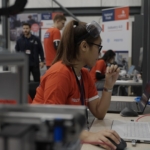‘Productivity slides again as workers put in longer hours with little to show for it’. Recent newspaper headlines greeting the latest UK productivity data had a familiar ring to them. We know that our productivity levels have been stuck in a long-term, downward trend for some time – and this month’s data confirmed this worrying picture. In fact, with a third consecutive quarterly fall in productivity, we are now in the longest sustained period of decline in recent times. It is no overstatement to say that the UK is facing a productivity crisis and this calls on action from all of us who are working to improve the economy and our skills systems. It’s why the CBI’s new productivity report ‘Just the job’ and our own launch of the WorldSkills UK Productivity Lab are incredibly timely.
In their report, the CBI encapsulate the fixed nature of our productivity growth (or rather, lack of it): ‘UK productivity increased just 3% between 2006 and 2016 – over 3 times slower than in the US. This has further widened the gap between the UK and our competitors, with UK productivity now 16% behind the rest of the G7’. In his speech to the CBI this week, the UK Chancellor, Philip Hammond MP underlined the centrality of improving productivity in the context of strengthening the wider economy: ‘Working together to raise productivity is the only sustainable path – not only to higher wages and rising personal living standards… but also to delivering our social objectives, and our strategic goals, such as decarbonisation’. If we get our productivity moving in the right direction, it can unlock so much of the UK’s wider economic potential. The CBI’s focus in ‘Just the job’ is on the ‘people practices’ businesses can employ to get the most from their staff: leadership, management, engagement, recruitment and training processes all contribute to how productive a workforce can be. The report contrasts the UK’s poorer record on people management and its correlation with lower productivity when compared to rates in the US and Germany: if for instance, we could match the US’s performance on people management, the productivity of the UK workforce would jump by 12%. There is so much to be gained from really thinking about how we best utilise the talents of people once they are in employment, and the CBI’s new report makes a vital contribution to this debate.
There’s also a prior question when it comes to measures we can take for boosting our productivity, and that relates to the way we educate and train our young people: the workforce of the future. Whilst we need to do all we can to maximise people’s potential once they’re in the workplace, getting the design of their training right beforehand gives us so much more opportunity to do that. So the report we have launched this week in partnership with colleagues at the RSA and FETL takes a deep dive into the best of international skills systems to draw out the lessons we can apply here in the UK. The importance of designing the right skills systems is underlined by our report: ‘Econometric analyses have shown that improvements in workforce skills contributed to 20 percent of annual productivity growth in the late 1990s and early 2000s, allowing Britain to significantly close the gap with its global peers. This has continued in the period since the 2008 recession, suggesting that continued skills improvements helped avert an even more severe economic slowdown’. The productivity dividend that can be realised from the right skills system approach is therefore significant. Our report demonstrates how in economies as diverse as Switzerland, Russia, Singapore and Shanghai, leveraging WorldSkills competition standards and practices are helping to drive improvements in skills systems. The implication is a powerful one: if we in the UK can get better at integrating international expertise in skills competitions we can improve our skills systems and therefore boost our productivity.
And it’s for this reason that this new report marks the launch of an exciting programme for us: the WorldSkills UK Productivity Lab. We believe that the best way for us to have a much broader impact is by developing and sharing our methodology on what it takes to become world-class in skills and our insights into how other countries in the WorldSkills global network are innovating to develop skills systems to meet their economic needs and boost their competitiveness. The Productivity Lab is designed to undertake research and transfer knowledge to help mainstream world-class excellence across UK skills systems, helping to make the UK more productive and competitive. WorldSkills UK already does a lot to raise aspirations and inspire success amongst thousands of young people every year through competitions, but we know we can and must do more. We intend to make the best possible use of WorldSkills International as a global benchmarking platform, the only one of its kind for international skills, to help ensure the UK remains at the cutting edge of international best practice in skills innovation.
So despite the gloominess surrounding UK productivity at the present time, I see many reasons to be optimistic. As the Chancellor said this week, we are only going to raise our games by working together and that’s why it’s so encouraging to see new ideas from business – in the shape of the CBI’s new report – and our own contribution in partnership with our partners at the RSA and FETL. What’s clear is that improving productivity rates is only going to be achieved by taking a forensic top-to-bottom approach, so whether that’s looking at the design of our skills systems or how we manage people once they’re in employment, it all contributes to the bigger goal. I believe that our new Productivity Lab is launching at just the right time to make a major contribution to the debate. We will be working hard over the coming months and years on this project and look forward to working with all our partners in industry, education and governments to build world-class skills systems right across the UK to boost productivity and competitiveness.


